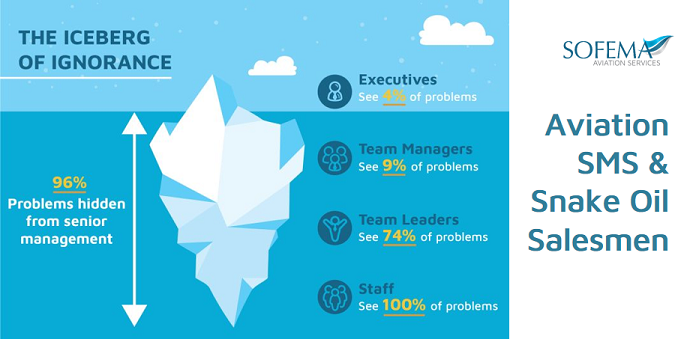A Recent Post regarding Aviation SMS where Steve Bentley – CEO of Sofema Aviation Services, shared the organisational communication challenge depicted by the Iceberg of Ignorance together with the need to develop a strong understanding of the challenge of building resilience into our organisations, drew a response from purveyors of SMS Software which caused Bentley to consider the role of Software to support an SMS System.
How such software is often miss-sold and what is the reality of an effective SMS system – please do comment and challenge anything Bentley said. It is only through a shared understanding of what works and what does not, that organisations can develop an efficient cost-effective, and organisationally beneficial SMS which supports the Leadership Team to optimise the business, concurrent with the highest level of Safety expected.
Here a few home truths about SMS:
- If the SMS is not top-down with 100 % of the leadership team on board it will underperform.
- A critical element is the organisational culture and particularly the willingness of people to report into the system (But not only – there needs to be a level of competence which enables reporting which drives safety and adds business value.
- The SMS Software (If employed is a tool) & does not a “system make”.
- Many senior persons within an organisation do not have a clear understanding of the difference and relevance of Direct Cause, Contributing Causes, and Root Causes.
- Aviation Authorities in general and European Regulatory Authorities, in particular, do not understand either how to (or choose not to) perform performance audits of an SMS – instead, they carry out tick the box compliance audits (adds no value to the Organisations System).
- Organisations believe that if the Regulatory is happy then all is good – clearly missing the opportunity to benefit from business process optimisation.
- Training throughout the SMS system is often weak and fails to engage in a way that will provide the required outcome.
- A key element of effective training is to measure the effectiveness of the training – how many organisations are doing this?
- Risk Registers are often “underpopulated” – This is an essential component of any effective SMS.
- Risk assessment is often performed by persons with insufficient competence to be considered subject matter experts.
Summary
The above is only a snapshot of the current situation. Simply put Bentley contends that this story is not about an unacceptable level of safety – Our aviation system is fundamentally sound.
It is a story of missed opportunity and inefficiency within and throughout the business process. Pareto Principle (sometimes called the 80 / 20 Rule) states that sources of a problem can be divided into two categories:
- The vital few: A small number of sources that account for most of the problem.
- The useful many: The large number of remaining sources that individually and collectively account for a relatively small part of the entire problem.
Next Steps
Sofema Aviation Services (SAS) www.sassofia.com – with over 50 years of commercial aviation experience – supports organisations to deliver an effective SMS with a wide variety of training courses available here
Follow this link to our Library to find & Download related documents for Free.
If you have any questions or need additional training details, please email team@sassofia.com
Tags:
aviation, aviation safety, Safety Management System, SMS system, Aviation SMS, SAS blogs, Iceberg of Ignorance, SMS Software




